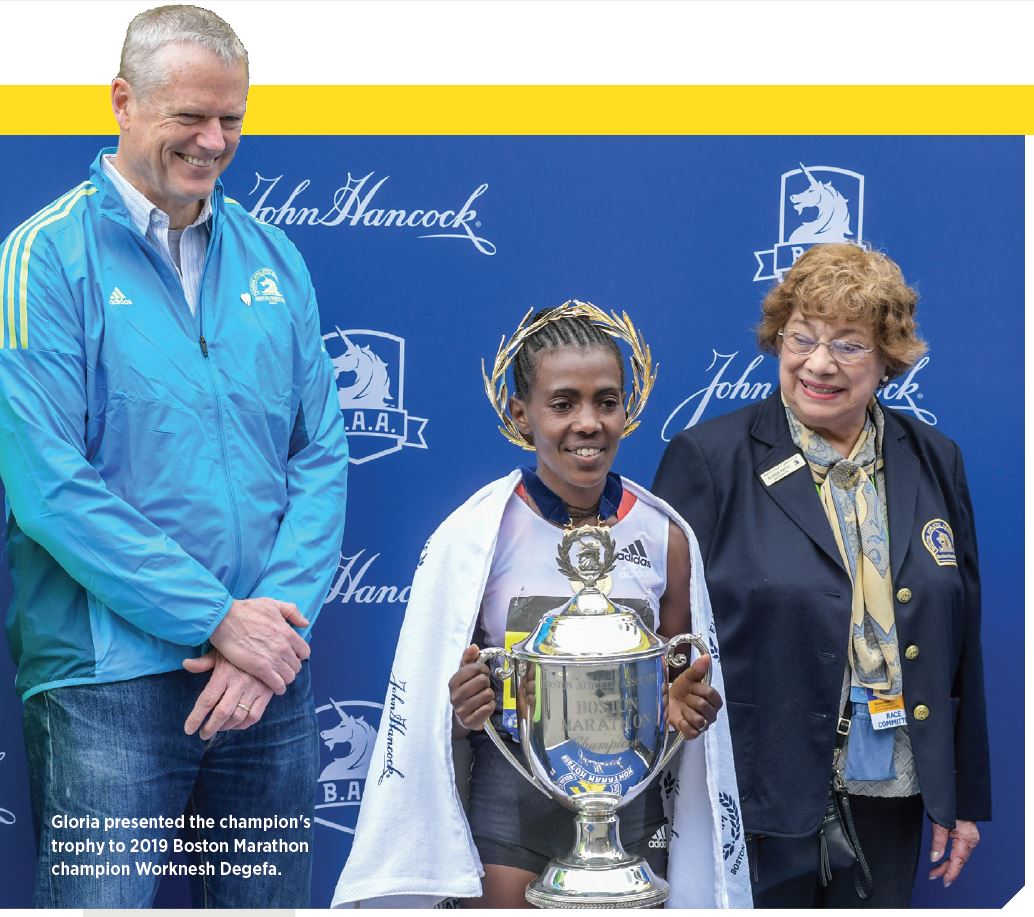
Gloria presented the champion's trophy to 2019 Boston Marathon champion Worknesh Degefa.
" Gloria was everyone’s mother. She truly cared about every person she met and wanted them to thrive and succeed. "
— Dr. Michael P. O’Leary, Chairman of the B.A.A. Board of Governors
to professional. Gloria was not going to shortchange women from earning the same as their male counterparts, breaking a glass ceiling that was typical at other events. Gloria also had a keen eye for storytelling and significance: she helped design the perpetual Boston Marathon champion’s trophy, now one of the most recognizable symbols in all of road running.
“The real force of her nature was the employment of high standards and commitment to excellence,” said B.A.A. President and C.E.O. Tom Grilk, who first noticed Gloria’s dedication while she was still a finish line volunteer. “With Gloria, it was this very strong personal commitment to excellence, to getting things done the best they can be and the way that they ought to be done. The core value that drove her was that things should be done as well as possible.”
Recognizing Gloria’s sense of history and deep respect for tradition, Guy Morse tapped
Gloria to serve as B.A.A. archivist and historian approaching the centennial Boston Marathon in 1996, aiming to tell the event’s history through artifacts, memorabilia, and its many champions. Orchestrating a traveling exhibit and speaker series, Gloria helped connect the race’s history with runners and non-runners alike throughout Greater Boston. With each stop, Gloria made everyone feel like the Boston Marathon was their marathon, instilling a sense of pride and ownership of the event that brought the community even closer together.
At the time, the B.A.A.’s archives were extremely limited due to past financial constraints and a fire. Piece by piece, medal by medal, the B.A.A. archives quickly transformed into a plethora of trophies, photographs, bib numbers, shoes, and apparel, all thanks to Gloria’s ability to connect with others and demonstrate the race’s legacy. Yet Gloria didn’t just collect items; she sought to explore and share the
never-before-known stories and legacies of champions, notable finishers, and early B.A.A. founders. Building upon her work year after year, she established relationships with athletes, coaches, and officials in a way very few could, maintaining meaningful connections that lasted throughout her life.
Patriots’ Day was when Gloria shined brightest. From sunup to sundown, Gloria was everywhere: escorting dignitaries around the start in Hopkinton; leading the Grand Marshal towards the finish line in Boston; teaching politicians how to properly place the olive wreath upon a champion’s head (“If it falls off, you’re in big trouble!” she’d quip); and sharing tidbits of race history with newly crowned winners. Gloria welcomed one and all into the Boston Marathon family, spreading a sense of belonging that would often be reinforced with handwritten notes. Throughout a traditional race weekend, the line to say hello to Gloria was at least five people deep. Everyone felt personally connected to Gloria and the Boston Marathon.
“Gloria may not have been an athlete, but she had terrific stamina, especially during race week,” said Joann Flaminio, the first female president of the B.A.A. and a close confidant of Gloria. “She was the first to arrive and last to leave at each and every event. Often it would take an hour for us to walk from the Expo back to the hotel as people would stop and she would regale them with a story or two. If you had running shoes on, she would talk to you. She spread the good word of the B.A.A. and the Boston Marathon everywhere she went.”
Gloria applied this same diligence to her role as B.A.A. Vice President, attending every staff meeting, taking copious notes, and never missing a detail for the race ahead. Prior to the pandemic, Gloria could be found holding court